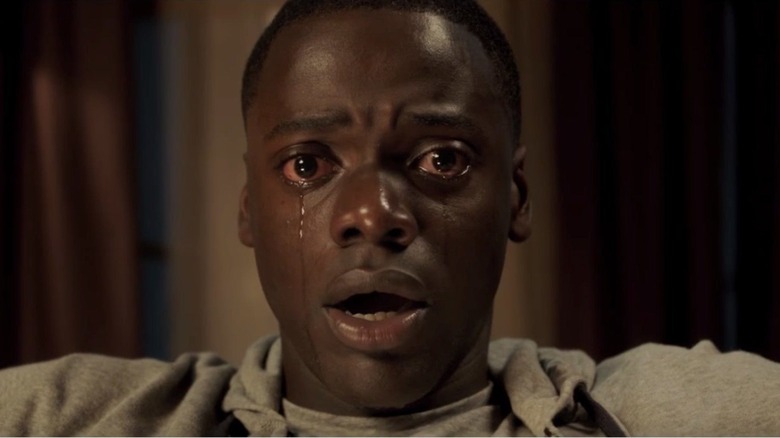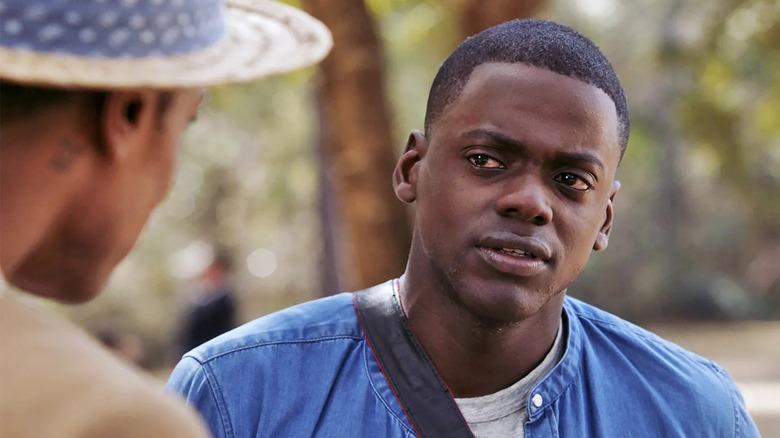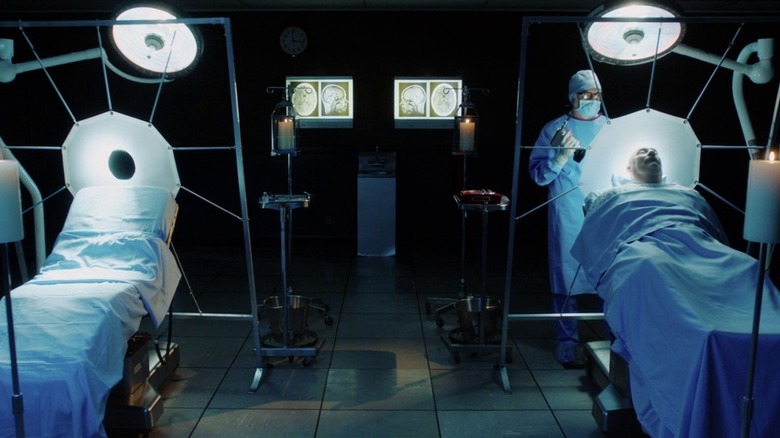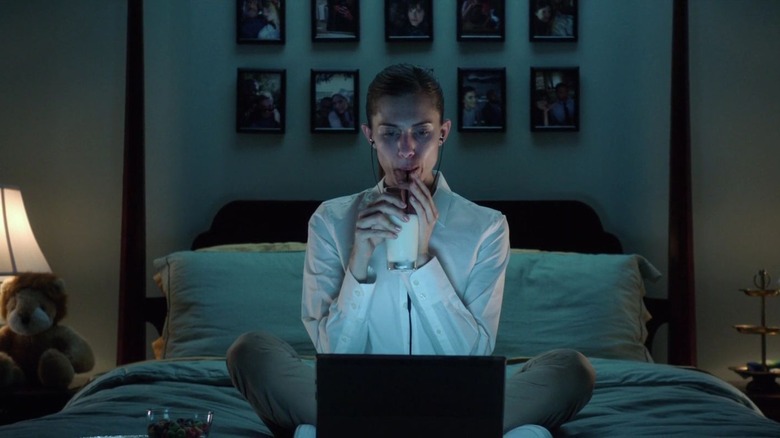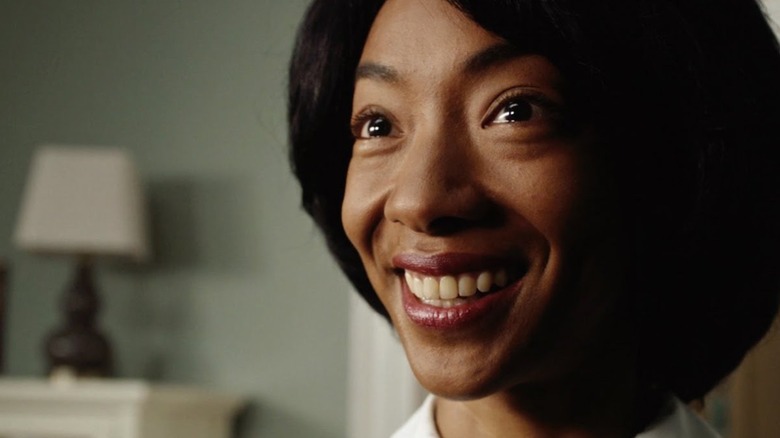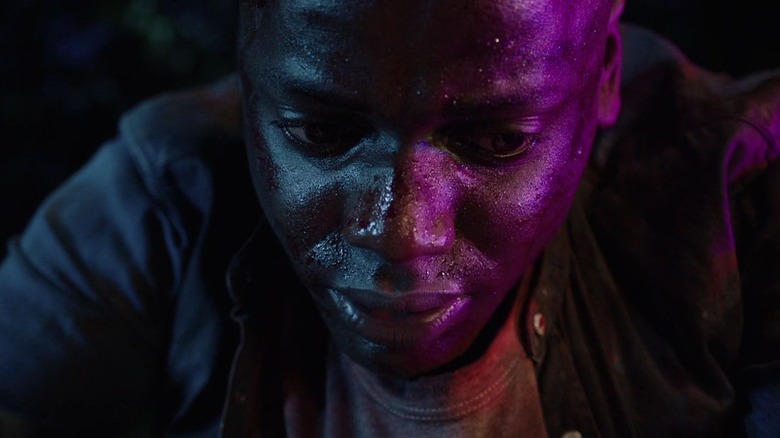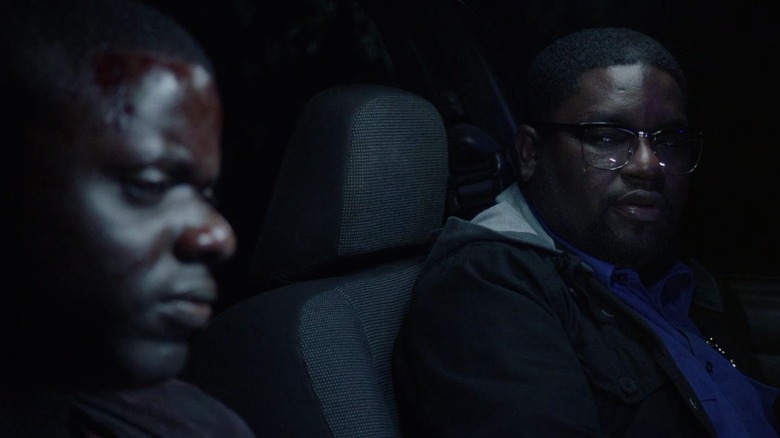Get Out Ending Explained: Welcome To The Sunken Place
When "Get Out" hit theaters in 2017, critics and audiences alike were blown away by its deft storytelling, sharp humor, and its unique way of exploring the horrors of racism. The film won the Academy Award for Best Original Screenplay that year, making writer and director Jordan Peele the first Black man to win the award. "Get Out" is a movie with several shocking twists, following Chris (Daniel Kaluuya) as he goes to meet his white girlfriend Rose's (Allison Williams) family at their country estate. There's something sinister going on with Rose's family, as the Black servants are acting strange and the only other Black guest screams "Get out!" at Chris when he's startled by a camera flash. It's wild stuff made all the wilder by the movie's final act, which reveals that the seemingly-progressive family are engaging in some body-snatching enslavement.
"Get Out" mixed humor and horror to great effect, and in the final moments of the movie when Chris is rescued by his best friend Rod (Lil Rel Howery), that humor comes into full effect. The ending turned expectations on their head, but originally Peele had something much more upsetting in mind. Let's dig into "the sunken place," Coagula, cereal, and the alternate ending that would have made "Get Out" a very different film.
What you need to remember about the plot of Get Out
In "Get Out," Chris goes to visit the Armitage family while they're having a get-together with some other wealthy white friends. Mr. Armitage (Bradley Whitford) jokes that he wishes he could have voted for Obama a third time and Mrs. Armitage (Catherine Keener) seems pleasant, but there's something strange going on. At the garden party, Chris approaches the only other Black guest (LaKeith Stanfield), who is dressed like an old white man and acts rather strangely. When someone takes a photo, his eyes change, and he screams at Chris to "Get out!" but unfortunately Chris doesn't take the advice and is soon sucked into the Armitage's wicked plan. Mrs. Armitage uses her spoon and teacup to hypnotize Chris, sending him to "the sunken place," a pitch-black void where he can see through his eyes but can't control his body.
Chris tries to contact the outside world and asks Rose to leave several times, but he's thwarted at every turn. His phone gets taken off the charger by the Armitage's maid, for example, and Rose has a way of explaining things away and calming him down. Unfortunately, Chris should have listened to his gut, because his body ends up being auctioned off at the garden party while he's away chatting with Rose.
What happened at the end of Get Out?
Chris ends up realizing that he's in real danger and goes to leave, but Rose grabs the keys and reveals that she's been in on her family's evil plot all along. It turns out that the Armitages are carrying on a family tradition as part of the Order of Coagula, transferring a white person's mind into the body of a Black person, all the while keeping the Black mind subjugated and trapped in the sunken place. Chris's body has been purchased by a wealthy progressive in a wheelchair (Stephen Root) who longs to walk again. He even tells Chris that it's "nothing personal," though how could it not be when Chris is having his entire existence taken from him?
In a violent and brutal escape, Chris kills Rose's parents and brother before making it out onto the lawn (where Rose chases him down with the Black gardener, who is possessed by Rose's grandfather). Chris uses his phone's flash to give the real owner of the gardener's body a chance to fight back, and he shoots Rose and then himself. Chris tries to strangle Rose but realizes he can't, and he's trying to figure out what to do when red and blue police lights appear. It's his best friend Rod, who works for the Transportation Security Administration, and he's here to save the day.
Villains wearing the faces of allies
So what is the ending of "Get Out" about, really? The movie is deeply layered with multiple themes that run throughout, intended to help non-Black audiences understand what it is like to be Black in America while also giving Black audiences something deeply relatable. Peele looked to the 2008 Democratic primaries and the fierce battle between Barack Obama and Hilary Clinton for inspiration, telling Vulture:
"It almost felt like, "Who has been waiting long enough? Is it the woman?" All boiled down. Racism and sexism were seen as two parallel problems. So I thought if you could make a movie as entertaining as 'Rosemary's Baby' and 'The Stepford Wives,' which have what should be an equally offensive notion — that men are going to conspire against women — you could do it with race."
The Armitage men in "Get Out" are awful, to be sure, but it's Rose and her mother Missy who trap and hypnotize their Black victims. Just as they are subjugated by the men in the family, they turn around and subjugate Black people. It's insidious but an apt allegory for the way some marginalized people will hurt other marginalized groups in order to get ahead themselves, made even more troubling by the fact that they're pretending to be progressive allies.
'Stay woke'
"Get Out" beautifully demonstrates the fear felt by many Black people in the U.S. in its first scene, in which we see Stanfield's character walking down the street in a wealthy neighborhood, talking to a friend on the phone about how he has to stay on his toes there. The term has since lost meaning but he has to "stay woke," keeping his head on a swivel. He ends up being kidnapped by Rose's brother, which is how he ended up at the Armitage party, and the opening credits play along to Childish Gambino's "Redbone," which features the lyrics "They gon' find you, gon' catch you sleepin', ooh, now stay woke!"
Throughout the film, the audience is invited to experience the fear felt by its Black characters, especially Chris. In feeling some of what Chris is feeling, non-Black audiences can learn something about being Black. (I assume Black audiences probably feel vindicated, but I am so white that I practically glow in the dark.) There are all too few heroic Black men in horror cinema, but thankfully, unlike Ben (Duane Jones) in "Night of the Living Dead," Chris survives and escapes. Then again, in Peele's original ending, he didn't.
Get Out's alternate ending
Originally "Get Out" had a much bleaker ending, with the police arriving and taking Chris away. They end up charging him with murder for all of the deaths at the Armitage house and he goes to prison for life. At the time, Peele felt like it was an appropriate ending because the wrong kind of "happy ending" might feel false to the movie's sentiments about racism — everything can't just be magically fixed.
Whitford told Vulture that he felt like the theatrical ending still shared some harsh truths about being Black in the United States:
"The ending he ended up with does a brilliant thing, because when Chris is strangling Rose in the driveway, you see the red police lights, and then you see the door open and it says 'Airport' and it's a huge laugh, and everybody has that same laugh and release. You understand from Chris's POV that if the cops come, he's a dead man. That is absolutely brilliant, non-lecturing storytelling."
There were some ad-libbed endings with Rod joking around after rescuing Chris as well, shared on the home video release of the movie. Most of them are pretty great, but we should all be glad that Peele didn't go with one that was a little too topical.
What have the cast and crew of Get Out said about the ending?
In the same interview with Vulture, Kaluuya shared that he thought the theatrical ending isn't as "happy" as one might think, but still pretty true-to-life:
"However, in hindsight, you still have that with the police lights, and Rod saves him through the black brotherhood — and also, Chris has a life, you know? He has to go out there even after he's experienced all this racism, and people expect you to see the world in the same way when they haven't experienced something like that. I thought that was really honest."
"Get Out" is a deeply layered horror film that has a lot to say and is filled to the brink with metaphors and symbolism that represent the subjugation of Black bodies, the insidious nature of racism, and much, much more. Not only that, but it's a brilliantly executed first feature filled with horror and humor from one of contemporary cinema's most talented creators.
